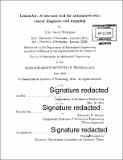LesionAir : a low-cost tool for automated skin cancer diagnosis and mapping
Author(s)
Wortman, Tyler David
DownloadFull printable version (33.82Mb)
Alternative title
Low-cost tool for automated skin cancer diagnosis and mapping
Other Contributors
Massachusetts Institute of Technology. Department of Mechanical Engineering.
Advisor
Alexander H. Slocum.
Terms of use
Metadata
Show full item recordAbstract
Skin cancer is the most common form of cancer in the United States; one out of every five Americans develops skin cancer at some point in their lifetime. Diagnosing cancerous lesions early is critical as it significantly increases the chance of survival. However, current techniques for diagnosing skin cancer lack specificity and sensitivity, resulting in many unnecessary biopsies and missed diagnoses. Although some researchers have increased diagnostic efficacy by quantitatively diagnosing skin cancer in an automated fashion, these methods require extremely bulky, expensive, and complicated equipment. This thesis presents the design and testing of LesionAir, a small, low-cost skin cancer diagnostic tool that measures the full-field compliance of the skin - which is well known to correlate strongly with skin cancer - by applying a vacuum force to the tissue and measuring precise deflection using structured light 3D reconstruction. Image processing algorithms determine additional morphological information about the potentially cancerous lesion. A pilot study of ten patients with suspect lesions validated LesionAir's effectiveness. After biopsy and analysis, a dermatopathologist confirmed the diagnosis of skin cancer in tissue that LesionAir identified as noticeably stiffer, and the regions of this stiffened tissue aligned nearly perfectly with the bounds established by the histological tests, which showed the method determines the precise coordinates that must be excised to safely remove all cancerous tissue. This technology can thus enable patients, primary care physicians, and dermatologists to rapidly identify and diagnose skin cancer with diagnostic quality not seen before from any equipment in this class.
Description
Thesis: Ph. D., Massachusetts Institute of Technology, Department of Mechanical Engineering, 2016. Cataloged from PDF version of thesis. Includes bibliographical references (pages 235-252).
Date issued
2016Department
Massachusetts Institute of Technology. Department of Mechanical EngineeringPublisher
Massachusetts Institute of Technology
Keywords
Mechanical Engineering.